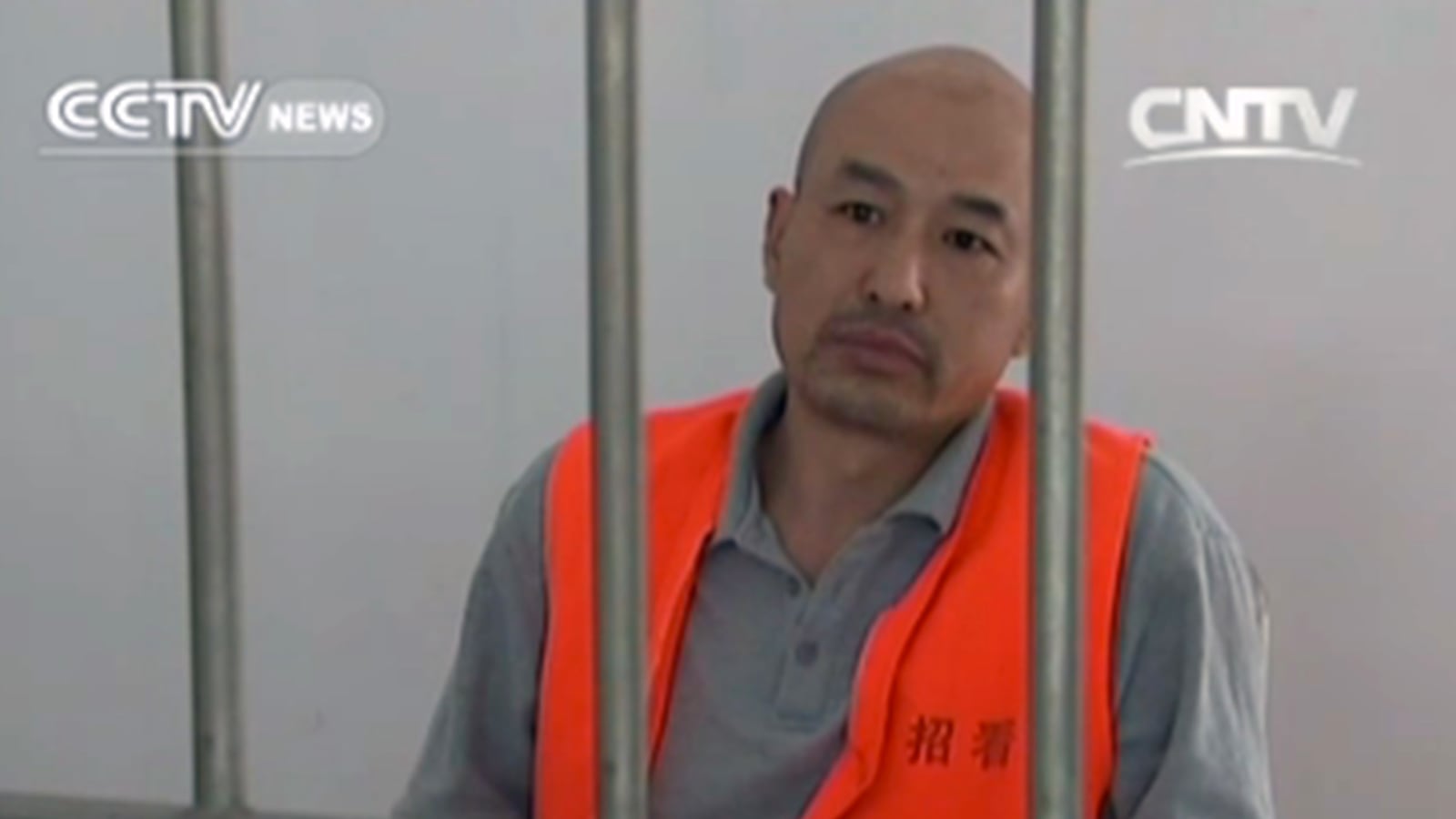HONG KONG — On May 28, Zhang Lidong beat a woman to death in a McDonald’s restaurant in eastern China after she declined to give him her phone number. When staff at the restaurant pleaded for him to stop, his daughter shot back, “Do you know who we are? Mind your own business!” Onlookers called the police, who arrived at the scene within minutes and arrested Zhang along with five others, including his son and daughter. Then things get stranger.
Cuffed and behind bars, Zhang told state media, “She was a demon, she was an evil spirit, so I beat her relentlessly, and stomped on her head with my heel. She wouldn't let me have her phone number, and my daughter said she was no good. She told me to kill her.” His prison confession was broadcast on CCTV last week. “We give no thought to the law. We only believe in God,” he said with an icy calm. “I felt good doing it.”
Authorities say Zhang and four others charged in the murder belong to a group called Quannengshen, which means Almighty God, though the Christian sect is most commonly known as Eastern Lightning. Zhang told authorities he had been a follower of Eastern Lightning for seven years, living off of savings he accumulated before joining the sect.
Despite the shroud of mystery surrounding the sect, a few details about its origins and central tenants have been brought to light by former adherents: A man named Zhao Weishan established the millenarian group in central China in the early 1990s. Eager to develop a following amongst underground Chinese Christians, he proclaimed that a woman known as Lightening Deng was the living host of Jesus Christ. Chinese press have reported that Lightening Deng’s real name is Yang Xiangbin, Zhao’s alleged mistress, who reportedly suffered a mental breakdown after failing the National College Entrance Examination. (In 2001, the Asian edition of Time headlined a feature on Eastern Lightning: “Jesus is Back, and She’s Chinese.”)
The sect has long been linked to violence as a method of recruitment, according to Chinese authorities, and Eastern Lightning (EL) has even been accused of kidnapping leaders of rival churches. David Aikman, former Beijing bureau chief at Time, described encounters with EL kidnapping victims in his 2006 book, Jesus in Beijing, including one man affiliated with the Tanghe network who said he was kidnapped with 33 other leaders in 2002. He claimed his kidnappers drugged him and assigned a woman to seduce him in his weakened state, threatening to disclose his adultery to other parishioners in his church if he didn’t relent.
The group has also been known to offer gifts like smartphones to potential followers, most of whom are unemployed. When their advances are rejected, they have allegedly abducted their targets and forced them to convert by employing beatings and coercive tactics, according to a former member who requested anonymity. The former member said the group entices men to join by providing young women as companions, allegedly stages fake exorcisms to heal the sick, and plays Taiwanese pop music in loops to brainwash their followers. The former member also said that Eastern Lightning preaches that their ultimate goal is to defeat the Great Red Dragon, which is an unsubtle allusion to the Chinese Communist Party. (Attempts to contact the leaders of Eastern Lightening to comment on these allegations were unsuccessful.)
In one case, a woman who hosted mass in her house for 20 Christians in Shanxi province said that Eastern Lightning kidnapped her and locked her in a room for nine days. She told The Daily Beast that EL members beat and whipped her, and tried to convince her that the local leader of Eastern Lightning was possessed by “the angel Lucifer.” When her screams attracted the attention of neighbors, her captors allegedly said that she was a relative who suffered from mental illness and apologized for her outbursts, only to increase the intensity of the torture afterward. She says she was released when she feigned acceptance of their dogma.
In December 2012, with the Mayan apocalypse looming, Eastern Lightning went on a recruitment binge, demanding donations from neophytes to repel the dark forces that aimed to bring the world to an end. Chinese media were quick to brand them as heretics. Across the country, over 1,300 members of Eastern Lightning were arrested. A year and a half later, when the McDonald’s killing surfaced online, the public hurled verbal attacks at the sect on social media. For several days, Eastern Lightning was public enemy No. 1.
Media and information are sensitive fields in China, which contributes to the tight regulation of religion within the state. Christianity is a particularly nervous subject, in part because of its role in weakening the last dynasty of imperial China. In the mid-1800s, a man from southeast China claimed to be the brother of Jesus Christ and founded an oppositional state within the Chinese empire. He amassed 30 million followers and attempted to topple imperial rule. The ensuing civil war resulted in 20 million deaths and a severely weakened ruling class. Even though this was a factor that led to the eventual rise of the Communist Party, the lesson was clear: Cults were efficient conduits for social engineering. The central government has since been wary of groups that could manipulate the beliefs of the general populace. In fact, members of the Party are required to be atheists.
It’s no wonder, then, that state-run media coverage of the McDonald’s murder has focused so much on the religious motivations behind it. In doing so, they’ve successfully redirected outrage away from the bystanders who watched a woman be beat to death and onto Eastern Lightning. “The implication is that religion needs to be strictly and strongly regulated, and this kind of incident only confirms that in the eyes of party bureaucrats, government bureaucrats, and frankly, a lot of Chinese people,” Angela Zito, director of religion and media at New York University, told The Daily Beast. The state isn’t declaring religion pernicious, but in creating distinctions among specific religions—and in singling out Eastern Lightning as pernicious—it is declaring itself authority on the role of religion in China. “You need to have a bad guy in order to have a good guy, and [the authorities] are the arbiters of good and bad religion,” said Zito. “That leaves them in a position of power, and incidents like the McDonald’s murder shore up that position.”
For years, Chinese media has reported that Zhao and his Christ-mistress fled to the U.S. in 2000 (the sect was banned in the mid-’90s), where they were granted political asylum. A public affairs officer at the U.S. Consulate in Hong Kong was unable to confirm or deny these reports due to privacy concerns. However, adherents of Eastern Lightning have been spotted proselytizing in New York and California, particularly in cities with large Chinese-American and Korean-American populations. A representative of Eastern Lightning in Taiwan provided The Daily Beast with two phone numbers in New York believed to be connected to Zhao; those who answered claimed to be members of the church, but deflected questions about its alleged leader. An email sent to Yang, whose public record lists her as “president” of the church, was not returned.
Eastern Lightning adherents are forbidden from knowing the physical location of Zhao and his companion, the sect’s representative in Taiwan told The Daily Beast, and are discouraged to speak about him as an individual. But his followers aggressively spread his teachings by infiltrating house churches in China.
Mr. Tian, a man from southeast China who joined Eastern Lightning but fled its grasp in 2013, offered insight on the inner workings of the sect. “When everyone around you is accumulating food and water, packing their houses full of survival supplies, it does things to your brain,” he said, referring to their preparations for the Mayan apocalypse. “It changed my perception of what was real. I had to follow what everyone else was doing.”
Prior to joining Eastern Lightning, Tian practiced his Christian faith in a house church by joining a small group of Christians in worship in a family home. He said the private, exclusive nature of their assembly made it easy for a member of Eastern Lightning to become close with them. “She joined us in mid-2012, and became increasingly vocal as we spent more time together.” Tian said that the newcomer distributed literature printed by Eastern Lightning, and shared her visions of the Messiah returning to Earth as a Chinese woman. Tian didn’t want to be left out “in case her visions were real,” and was inducted into the sect.
Once he was part of Eastern Lightning, Tian says, he was warned that he would be struck by lightning and killed if he tried to leave the group. But he was fully devoted to EL, and made preparations for the looming doomsday. “December [2012] came, and nothing happened. Our leader said it was because they saved the world, but then some of us started to doubt her.” Those seeds of dissent led to Tian’s decision to relocate and start anew. “Besides, I found out some of the followers only joined so they could follow Zhao Weishan’s example—they wanted to go to the West by seeking religious asylum,” he says. Since leaving the group, he continues to practice his faith in a house church, but has severed all old connections.
Following the McDonald's murder, authorities swiftly began making arrests on people whom they said were associated with Eastern Lightning—the first one being a woman who had allegedly been distributing materials produced by the sect. She was quickly found guilty on the vague charge of “organizing and using a religious cult to break laws” and sentenced to five years in prison. Members have been arrested in other parts of China. While some have been given prison sentences of three to four years, police say that most will likely be released after several days in detention. There are a rare few like Tian who can identify local leaders of Eastern Lightning and assist law enforcement in the crackdown, but they live in fear of retaliation. “That woman was a stranger, but they still beat her to death on a whim.” Tian said, “Think of what they would do to a ‘traitor.’ They are scary people, and I don’t want to die.”
With Lizzie Crocker in New York






